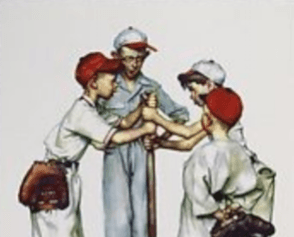Search results for 'Purpose' (36)

Have you ever had a phrase keep forcing its way into your consciousness? Lately, "do what you love" has done that with me. "Do what you love and love what you do." Sounds good, right? Or how about "Do what you love and never work a day in your life." There is even a book titled, Do What You Love and the Money Will Follow . My Google search also produced, “Doing what you love is where happiness lives.” Wonderful sentiment but is it realistic that we can follow our desires to contentment, financial success and happiness? The website that charged $233 for an online course sure seemed to think so. Here is the banner for that course. Do What You Love: The life-changing e-course. Design your life the way you want to live it! As I looked through the outline of the course something immediately struck me. The first section of it was titled, Choose Your Destination. In other words, begin with the end in mind. I'm not suggesting that you take this course; no, my advice is quite the opposite. Instead of beginning with the end in mind begin with the beginning in mind. “Let us make them in our image, after our likeness.” The Our section of Our Journey WITH God begins with this all-important passage from Genesis. When we embrace the deeply profound significance of this verse we begin a journey to knowing who God is, which leads to knowing who we truly are. First and foremost, we were created uniquely. Being precedes doing. In understanding who God created us to be we then discover our divine purpose. While doing what you love might make you happy, being who you are impacts the world as God planned for you. Take this phrase with you today, “Be who you were created to be.”

Our Journey WITH God is finished!!! . .. IN GOD'S TIME It has been 5 years, 7 months and 23 days since I started writing this book, but hey, who's counting?!? It has been an incredible experience, unlike any other and I'm really excited to share it with you! Maria, my wonderful, lovely, patient, selfless wife, was my editor from beginning to end. One day, near the end of the process, she mentioned writing another book. I said, "Stop right there! When you were giving birth to our children, did I tell you I wanted to have "another" one?!?" (Moms: please understand that I'm not suggesting that this was as tough as child birth, only that it was a labor of love that I needed to "recover" from). Maria and I laughed as she apologized and we agreed to put "another book" on the back burner, preferably on a stove somewhere very far away. While a due date for the birth of a baby is somewhat of an estimation, I have to admit I missed the "due date" of Our Journey WITH God by...a lot!!!! Not days or weeks, but months!!!!!! I guess I should have known. If you're answering the call to write a book about a journey with God, you should expect to—go on a journey with God. I did, but like so many things in life, (especially parenting) I had no clue what was in store for us. Days of excitement about a new concept or completed section were often followed by frustrating delays driven by mass deletions and whole section re-writes. Simply put, this was...a journey. God has been good to us throughout the ups and downs and twists and turns of authoring this book, just as He is in all of life. In God's time, the book was finished. I give God the glory and look forward to what He has prepared for me in this next phase of my journey and I hope you'll purchase the book to join me on the journey. Click here to buy Our Journey WITH God and I'll sign it for you and ship it for free!

When Joey, our oldest son, was five years old we signed him up for an instructional soccer league. At one of Joey's first practices, the coach broke the large group of boys and girls into teams. Joey quickly demonstrated a knack for dribbling a soccer ball that most of the other kids didn't seem to have yet. Before long Joey was scoring goals almost at will. Even placing him on defense didn't slow him down as he ended up with seven goals. One of the father's observing this, commented to me about Joey saying, "He's intense!" The thought crossed my mind that Joey might be special. This plays out in the Gospel this week as well. When the time arrived for Elizabeth to have her child she gave birth to a son. Her neighbors and relatives heard that the Lord had shown his great mercy toward her, and they rejoiced with her. When they came on the eighth day to circumcise the child, they were going to call him Zechariah after his father, but his mother said in reply, "No. He will be called John." But they answered her, "There is no one among your relatives who has this name." So they made signs, asking his father what he wished him to be called. He asked for a tablet and wrote, "John is his name," and all were amazed. Immediately his mouth was opened, his tongue freed, and he spoke blessing God. Then fear came upon all their neighbors, and all these matters were discussed throughout the hill country of Judea. All who heard these things took them to heart, saying, "What, then, will this child be?" For surely the hand of the Lord was with him. The child grew and became strong in spirit, and he was in the desert until the day of his manifestation to Israel. Luke 1:57-66, 80 Some context is important here. Elizabeth was barren and both (she and Zechariah her husband) were advanced in years, so her pregnancy was special. Additionally, the naming of the baby was also unusual. The expectation to give children the "family" name was a powerful one in biblical times. No one would have blinked an eye if Elizabeth's son had been named after his father, Zechariah. This progression of events pointed to something special about baby John as everyone wondered, "What, then, will this child be?" Later in Luke's Gospel, as John has actually faded from the scene, Jesus makes a profound statement about him. "I tell you, among those born of women, no one is greater than John..." Elizabeth and Zechariah's little John became the forerunner of Jesus, the Christ. He really was special but as Jesus followed up this pronouncement about John He said, "yet the least in the kingdom of God is greater than he." In other words, special in God's eyes is very different from that of the world. Joey was a special soccer player when he was young. But he never even played varsity soccer in high school. "What, then, will this child be?" Joey's natural intensity and passion have made him an exceptional 8th-grade math teacher. He also revived his school's soccer program in just a couple of short years. He impacts the lives of impressionable, underprivileged kids in ways he probably will never know. John the Baptist became the person God had created him to be. I love knowing that Joey is doing the same. I wonder about how well I'm doing on the same account. How about you?

Do you have doubts? Me too. We all do about one thing or another. Why is that? Did you know that the very first thing Satan said in the Book of Genesis was intended to create doubt? He said to Eve, "Did God really say?" Doubt has been a part of our common human condition since the beginning of time. We read about doubt throughout the Bible. In the New Testament, we frequently read about the disciples' doubt. In this week's Gospel, it appears at a significant moment in time. The eleven disciples went to Galilee, to the mountain to which Jesus had ordered them. When they all saw him, they worshiped, but they doubted. Then Jesus approached and said to them, "All power in heaven and on earth has been given to me. Go, therefore, and make disciples of all nations, baptizing them in the name of the Father, and of the Son, and of the Holy Spirit, teaching them to observe all that I have commanded you. And behold, I am with you always, until the end of the age." Matthew 28:16-20 In this case, the disciples' doubt occurs concurrently with their worship. How is that possible? When the resurrected Jesus appears their first response is to worship Him. And then they doubt. Jesus' response to their worship and doubt? As God, He commissions them to "go" and do for God. Then Jesus concludes with a statement that leaves no doubt. "And behold, I am with you always, until the end of the age." Doubt originated in the Garden of Eden. Doubt is the human part of our relationship with God. But as we see here in Jesus' concluding statement, there is no doubt in God. He is always and forever with us. If we are honest with ourselves, it is natural to doubt that things are going to work out the way we want. What do we do with our doubts? We must rely on the words of Jesus, "I am with you always, until the end of the age." That leaves no doubt!

I had a conversation with my brother yesterday where he excitedly told me about his pending graduation. Jeffrey has gone back to school in order to start a second career. As a highly thought of student, he is receiving job recommendations from his instructors. I asked him what he was looking for in his new career and employer. He made it clear that he wants to work for a company that will provide a mentor for him as well as a chance to grow professionally. We see this same dynamic in this week's Gospel: Jesus said to his disciples: “Go into the whole world and proclaim the gospel to every creature. Whoever believes and is baptized will be saved; whoever does not believe will be condemned. These signs will accompany those who believe: in my name they will drive out demons, they will speak new languages. They will pick up serpents with their hands, and if they drink any deadly thing, it will not harm them. They will lay hands on the sick, and they will recover.” So then the Lord Jesus, after he spoke to them, was taken up into heaven and took his seat at the right hand of God. But they went forth and preached everywhere, while the Lord worked with them and confirmed the word through accompanying signs. Mark 16:15-20 Jesus has very high expectations of His followers. He details some of the things that they can expect to see after He departs. Surely they marveled at His words and more importantly at the actual signs as they occurred. There is a pattern here that is important. Jesus predicts what will happen. The disciples go forth in faith preaching Jesus' Good News. Jesus comes through on His prediction. There is one element of this pattern that can't be overlooked. Note the phrase, "...while the Lord worked with them". Jesus is actively engaged with His followers to bring about His purposes. I hope Jeffrey can find a job and an employer who will mentor him and give him a chance to grow. He will know once he starts working whether or not the employer lives up to their promises. We should have no such question in our work for Jesus. We simply need to go to work trusting that He will mentor us and give us a chance to grow.

It’s snowing again this morning. March in southwestern Pennsylvania; it was three times warmer in February! I wonder if the poor flowers that sprouted early will survive? Those bulbs beneath the frozen ground eventually bring us the first glimpse of spring. It is almost here. I can’t wait!!! The Gospel does the same this week. Some Greeks who had come to worship at the Passover Feast came to Philip, who was from Bethsaida in Galilee, and asked him, "Sir, we would like to see Jesus." Philip went and told Andrew; then Andrew and Philip went and told Jesus. Jesus answered them, "The hour has come for the Son of Man to be glorified. Amen, amen, I say to you, unless a grain of wheat falls to the ground and dies, it remains just a grain of wheat; but if it dies, it produces much fruit. Whoever loves his life loses it, and whoever hates his life in this world will preserve it for eternal life. Whoever serves me must follow me, and where I am, there also will my servant be. The Father will honor whoever serves me. "I am troubled now. Yet what should I say? 'Father, save me from this hour'? But it was for this purpose that I came to this hour. Father, glorify your name." Then a voice came from heaven, "I have glorified it and will glorify it again." The crowd there heard it and said it was thunder; but others said, "An angel has spoken to him." Jesus answered and said, "This voice did not come for my sake but for yours. Now is the time of judgment on this world; now the ruler of this world will be driven out. And when I am lifted up from the earth, I will draw everyone to myself." He said this indicating the kind of death he would die. John 12:20-33 in the midst of the Passover Feast Jesus’ presence has created a buzz. The Greeks from afar want to see Him. The disciples have their expectations of Jesus’ role but His words continue to puzzle them. Jesus, on the other hand, clearly understands His purpose. Jesus provides an unsolicited explanation of the meaning of life and death. Death must come in order for new life to spring forth. Our winters are the same. All flowers wilt and eventually die in the fall. Green turns to brown and the snow buries everything in winter white. And yet hope lies beneath the surface. The disciples surely struggled to understand the meaning of Jesus' prediction. Death? Jesus demonstrated what it meant to live through death. We are called to do the same. We must be willing to die to self so that we can live in Him. This is the harsh reality of the Christian life. But the beautiful fruit that results is worth enduring, just like our winter!

I recently read a book about God and the human brain. In the book, researchers asked people what they thought God looked like. The question produced a lengthy pause in most adults. This was significant to the neuroscientist because it meant that a great deal of neurological activity was taking place as different parts of the brain attempted to put into words a concept that defies the parameters of language for many people. In this week's Gospel, we hear about someone who surely wrestled with a description of what God looked like. Jesus said to Nicodemus: “Just as Moses lifted up the serpent in the desert, so must the Son of Man be lifted up, so that everyone who believes in him may have eternal life.” For God so loved the world that he gave his only Son, so that everyone who believes in him might not perish but might have eternal life. For God did not send his Son into the world to condemn the world, but that the world might be saved through him. Whoever believes in him will not be condemned, but whoever does not believe has already been condemned, because he has not believed in the name of the only Son of God. And this is the verdict, that the light came into the world, but people preferred darkness to light, because their works were evil. For everyone who does wicked things hates the light and does not come toward the light, so that his works might not be exposed. But whoever lives the truth comes to the light, so that his works may be clearly seen as done in God. John 3:14-21 Nicodemus receives multiple images for God in his conversation with Jesus. The first is of the Son of Man, then he hears of God as a loving Father. Next, Jesus describes God as light coming into the world. What a profound experience this must have been for Nicodemus. What must his brain have been experiencing as Jesus' descriptions challenged his previous images of God? When you read this Gospel what does God look like to you? I imagine two images. One is of Jesus suffering unbearably on the cross. That image comes in a variety of forms as I recollect everything from various crucifixes and paintings I've seen to the brutally graphic depiction of the crucifixion in the movie The Passion of the Christ by Mel Gibson. The second image I imagine is more vague. In fact, I struggle to even explore it because I can't fathom its depth. As a father, my brain can't even begin to grasp what God the Father saw as life ebbed away from the body of His beloved Son. What does God look like? I can't think of a better answer than, "God so loved the world..."

DISCLAIMER: I want to be completely transparent here. This is not just "a crummy commercial!" In fact, I had to have my editor approve this particular message before, during and after writing it. Timing is everything right? For the last four years I have been writing a book entitled, Our Journey With God. No, I am not announcing its completion but I do want to share with you what is about to happen. The time has arrived for me to take the Our Journey With God message public. Read through this week's Gospel and you'll catch the drift of what I'm saying. The Spirit drove Jesus out into the desert, and he remained in the desert for forty days, tempted by Satan. He was among wild beasts, and the angels ministered to him. After John had been arrested, Jesus came to Galilee proclaiming the gospel of God: "This is the time of fulfillment. The kingdom of God is at hand. Repent, and believe in the gospel." Mark 1:12-15 These few short verses mark a pivotal point in Jesus' life as well as John the Baptist's. St. Mark treats Jesus' time in the desert rather briefly. This is especially interesting compared to the story of Jesus' three temptations by Satan in Luke and Matthew. The point is that after His baptism by John the Baptist, Jesus is immediately led into the desert by the Spirit for a time of preparation before beginning His public ministry. After that comes Jesus' proclamation: "This is the time of fulfillment. The kingdom of God is at hand. Repent and believe in the Gospel." For me, Our Journey With God is kind of like my proclamation of the Gospel. It has been an amazing journey up to this point but when I was asked to lead a Lenten parish mission it felt like God was saying to me "It is time, Joe." For four consecutive evenings, I will share the Our Journey With God message as Maria leads worship with songs we've chosen to enhance the message. The message, in a nutshell, is that "This is the time of fulfillment. The kingdom of God is at hand. Repent and believe in the Gospel." This message is as true today as it was 2000 years ago. And if people think it's a crummy commercial, so be it. I'm delivering the Gospel message He has given to me! Will you?!?

"I didn't do it on purpose!" There were lots of times when our young children would quickly explain their role in how something "got" broken. They wanted us to know their intent wasn't to break something. In this Gospel we clearly see Jesus' intent and purpose. On leaving the synagogue Jesus entered the house of Simon and Andrew with James and John. Simon's mother-in-law lay sick with a fever. They immediately told him about her. He approached, grasped her hand, and helped her up. Then the fever left her and she waited on them. When it was evening, after sunset, they brought to him all who were ill or possessed by demons. The whole town was gathered at the door. He cured many who were sick with various diseases, and he drove out many demons, not permitting them to speak because they knew him. Rising very early before dawn, he left and went off to a deserted place, where he prayed. Simon and those who were with him pursued him and on finding him said, "Everyone is looking for you." He told them, "Let us go on to the nearby villages that I may preach there also. For this purpose have I come." So he went into their synagogues, preaching and driving out demons throughout the whole of Galilee. Mark 1:29-39 As word spreads of Jesus' healing miracle, He is mobbed. The whole town showed up! Imagine Jesus finishing dinner and instead of relaxing, He heals many who were ill and possessed. Then St. Mark tells of Jesus' next act. "He left for the nearby village." Jesus was clear that, it was "on purpose" that He had to travel throughout Galilee. His message was and is meant to travel. We must deliver the message of Jesus to "the nearby villages." On purpose! When we do our part then Jesus can fix what is broken in our world!

It amazes me how many different ways that God speaks to me. (When I'm paying attention!) From the morning's sunrise to the song on the radio to the smile from my beautiful wife Maria, I try to hear God as often as possible. As the sun rose this morning, HIs message came to me through a book I am reading on discipleship. Not only was this book speaking of Jesus' calling of His disciples (This week's Gospel) but it also referred to another book I read years ago. So what is God saying? After John had been arrested, Jesus came to Galilee proclaiming the gospel of God: "This is the time of fulfillment. The kingdom of God is at hand. Repent, and believe in the Gospel." As he passed by the Sea of Galilee, he saw Simon and his brother Andrew casting their nets into the sea; they were fishermen. Jesus said to them, "Come after me, and I will make you fishers of men." Then they abandoned their nets and followed him. He walked along a little farther and saw James, the son of Zebedee, and his brother John. They too were in a boat mending their nets. Then he called them. So they left their father Zebedee in the boat along with the hired men and followed him. Mark 1:14-20 In his telling of Jesus' calling of His disciples, Mark's style comes through. His Gospel version is fast-moving and action-packed. Jesus calls and the disciples respond, leaving everything behind. Before long the disciples were watching as Jesus heals a demoniac, Simon's mother-in-law and as Mark continues, "He cured many who were sick with various diseases, and he drove out many demons..." All of this happened before the end of Mark's first chapter. Sometimes we read these passages and wonder why things aren't moving more quickly on our journey with God. I know I often hope God will heal and move mountains and bring peace...NOW! But the reality is that we need to grow in our relationship with God, continually. Jesus calls us all to follow Him. That means that we must accept that being a disciple of Christ requires that we leave the world behind us. As the the disciples did, we must spend time with Jesus getting to know Him better. Through our relationship with Him we become a part of Jesus' time of fulfillment, bringing His Kingdom to the world. Will you respond to His call today? "Come after me..."

I spoke to a friend today who just became a father for the first time. After months of waiting the baby had arrived. I immediately wanted to know what Rory's little girl's name was. Madeline Noel, how beautiful! Names are obviously important in this week's Gospel: John was standing with two of his disciples, and as he watched Jesus walk by, he said, "Behold, the Lamb of God." The two disciples heard what he said and followed Jesus. Jesus turned and saw them following him and said to them, "What are you looking for?" They said to him, "Rabbi" — which translated means Teacher —, "where are you staying?" He said to them, "Come, and you will see." So they went and saw where Jesus was staying, and they stayed with him that day. It was about four in the afternoon. Andrew, the brother of Simon Peter, was one of the two who heard John and followed Jesus. He first found his own brother Simon and told him, "We have found the Messiah" — which is translated Christ —. Then he brought him to Jesus. Jesus looked at him and said, "You are Simon the son of John; you will be called Cephas" — which is translated Peter. John 1:35-42 Jesus is referred to by no fewer than four names in this short passage (six if you count the definitions of two of them). Names were critically important in biblical times. Zechariah gave John (the Baptist) his name after hearing from the angel Gabriel. John pronounced one of Jesus' names as "Lamb of God." Andrew, knowing the significance of John's pronouncement immediately followed Jesus. Next is Simon who hears the long awaited name, Messiah, from his brother Andrew. When Simon meets the "Christ" he receives a new name, Peter. Parents choose their children's names with care, often giving names with great family meaning. So what is really in a name? Identity. We are identified by our names. In the case of Jesus, understanding His identity means we must understand the meaning of His many names. We also learn of His purpose. John's identification of Jesus as the Lamb of God speaks to why Jesus came. He came to be God's final sacrifice for sin. Jesus died for Rory and Madeline and for you and me. So what's in a name? When it comes to Jesus' name as the Lamb of God, He suffered and died so that our names could be written in the "Book of Life."

Have you ever used the phrase - what a waste of talent? I've been using it a lot recently but not because of this week's Gospel. Check out the Gospel and then I'll tell you what I've been doing with my talents. Jesus told his disciples this parable: "A man going on a journey called in his servants and entrusted his possessions to them. To one he gave five talents; to another, two; to a third, one--to each according to his ability. Then he went away. After a long time the master of those servants came back and settled accounts with them. The one who had received five talents came forward bringing the additional five. He said, 'Master, you gave me five talents. See, I have made five more.' His master said to him, 'Well done, my good and faithful servant. Since you were faithful in small matters, I will give you great responsibilities. Come, share your master's joy.' Matthew 25:14-15, 19-21 Jesus shares this particular parable directly with His disciples. In it Jesus makes clear reference to talents which in their most basic form are a measure of weight. A Roman talent would have weighed about 70 pounds. When this measurement was done using precious metals there was potentially great value in the talent. Jesus' message was that the servants are expected to increase the value of the Master's talents. In so doing they are affirmed by the Master and given even more talents. As is typical in Jesus' parables there is explicit meaning as well as deeper meanings. In this case the explicit is that Jesus is talking about a financial "talent" that is meant to be invested wisely. There is also the implicit understanding that talent can be understood as ability. Carrying that analogy through, points you and me to our God-given "talents". And that is where I have been spending a lot of my time lately. I just recently certified as a Strengths Finders coach. It is an assessment that identifies a person's strengths, ordering them from 1 through 34. Most people start with the basic assessment that identifies their Top 5 strengths. I coach people through their strengths so they understand how God has equipped them. As we begin, I explain that Strengths exist as a result of investing effort to develop a God-given Talent. Therefore, there is no guarantee that we produce a return on our Master's "investment." Talent can be wasted! We are all called to invest in our God-given talents in a way that builds the Master's kingdom. The coolest part of Strengths Finders is that in each of our Strengths (talents) there is a uniqueness that God has hard-wired into us. Mathematically it is a 1 in 33,000,000 chance that you will meet someone with your same Top 5 strengths in the same order. As Psalm 139 says, "You are fearfully and wonderfully made." We are all called to invest in the talents that God has placed within us. When we do we can look forward to hearing our Master's words: 'Well done, my good and faithful servant. Since you were faithful in small matters, I will give you great responsibilities. Come, share your master's joy.'

The Houston Astros won the World Series the other night. Maria and I stayed up late to watch because we have become Astros fans. Maria's favorite is Jose Altuve. He is one of the shortest players in the game but has become one of the best players in all of baseball. My favorite is George Springer who, like Altuve, plays with a childlike joy. Watching these guys celebrate their victory made us a smile, especially in light of the devastation that the people of Houston have endured. We see a lot of self-promotion and attention grabbing in the sports world so it was nice to see these men humbly pointing to the people of Houston as their motivation to win. Check out an opposite motivation in this week's Gospel. Jesus spoke to the crowds and to his disciples, saying, "The scribes and the Pharisees have taken their seat on the chair of Moses. Therefore, do and observe all things whatsoever they tell you, but do not follow their example. For they preach but they do not practice. They tie up heavy burdens hard to carry and lay them on people's shoulders, but they will not lift a finger to move them. All their works are performed to be seen. They widen their phylacteries and lengthen their tassels. They love places of honor at banquets, seats of honor in synagogues, greetings in marketplaces, and the salutation 'Rabbi.' As for you, do not be called 'Rabbi.' You have but one teacher, and you are all brothers. Call no one on earth your father; you have but one Father in heaven. Do not be called 'Master'; you have but one master, the Christ. The greatest among you must be your servant. Whoever exalts himself will be humbled; but whoever humbles himself will be exalted." Matthew 23:1-12 Jesus singles out the scribes and Pharisees for their attention grabbing behaviors. Jesus points to the many things they do to honor themselves, particularly in public. Using them as examples of what not to do, Jesus teaches that humble service is the way to go. It is easy to see a lack of humility in people. We don't need to look far in our media saturated world. But the real question is, are we humble? As someone who is in front of audiences frequently, I know how hard it is to not draw attention to myself. I believe the answer lies in what motivates us. Are we motivated by our love for God? It takes a lot of work to get to the core of our motivations, even as we serve. Humility is hard earned and it doesn't come easily. True humility comes from a profound motivation to pursue God and live for His purposes. The Houston Astros are World Champions, for the first time in their history. They achieved this through years of hard work. Finding a purpose greater than themselves and their baseball team allowed them to bring joy to many hurting people. That is what true humility does.

Desmond Doss is the Medal of Honor awardee whose life story is told in the movie Hacksaw Ridge starring Andrew Garfield. Doss, a conscientious objector, served in World War II as a combat medic. He heroically returned to the battlefield multiple times to save dozens of wounded soldiers. What motivates someone to so willing rush into harm's way? This week's Gospel answers this question. Jesus began to show his disciples that he must go to Jerusalem and suffer greatly from the elders, the chief priests, and the scribes, and be killed and on the third day be raised. Then Peter took Jesus aside and began to rebuke him, "God forbid, Lord! No such thing shall ever happen to you." He turned and said to Peter, "Get behind me, Satan! You are an obstacle to me. You are thinking not as God does, but as human beings do." Then Jesus said to his disciples, "Whoever wishes to come after me must deny himself, take up his cross, and follow me. For whoever wishes to save his life will lose it, but whoever loses his life for my sake will find it. What profit would there be for one to gain the whole world and forfeit his life? Or what can one give in exchange for his life? For the Son of Man will come with his angels in his Father's glory, and then he will repay all according to his conduct." Matthew 16:21-27 Jesus' rebuke of Peter who wants to protect Jesus from persecution seems incredibly harsh. "Get behind me, Satan! You are an obstacle to me. You are thinking not as God does, but as human beings do." Peter might have thought, "I'm only looking out for you Lord." Jesus made the predictions of His suffering and death knowing His Father's greater purpose. His disciples didn't know, so the thought of Him willingly accepting His persecution and death surely confounded them. I ask the question again. What motivates someone to willingly choose to enter harm's way? Desmond Doss had a clear sense of his purpose, informed by his faith. Before he ever entered into battle Doss had consciously made a number of decisions that influenced his actions on and off the battlefield. Simply put, Desmond Doss was willing to die for his fellow man because he was motivated by a greater purpose. Are you? Think through the ramifications of what Jesus is saying here. If you are a disciple of Christ you are expected to give your life for Him. It may not be in as dramatic fashion as Jesus or Peter, or even Desmond Doss, but we must be willing just the same. Prepare yourself as a soldier for Christ, poised to sprint out onto the battlefield of life. Now imagine receiving your very own medal of honor from Jesus who says, "He will repay all according to His conduct."

As I kid I was very fortunate to have the best Wiffle ball backyard in the neighborhood. We played with as few as two players but the best games were when we had bunch of kids. The challenge was choosing fair teams. We relied on an "ancient" ritual. This particular ritual provided a somewhat fair way to at least begin the "Choosin' Up" as Norman Rockwell's painting is titled. From there, teams were chosen primarily based on skill level. When a small number of kids were playing, the winning team was often determined by who "won" the coveted first pick. Of course it was never a good thing to be chosen last but we'll get back to that later. How does this apply to the Gospel you ask? Read on to find out. At that time, Jesus withdrew to the region of Tyre and Sidon. And behold, a Canaanite woman of that district came and called out, "Have pity on me, Lord, Son of David! My daughter is tormented by a demon." But Jesus did not say a word in answer to her. Jesus' disciples came and asked him, "Send her away, for she keeps calling out after us." He said in reply, "I was sent only to the lost sheep of the house of Israel." But the woman came and did Jesus homage, saying, "Lord, help me." He said in reply, "It is not right to take the food of the children and throw it to the dogs." She said, "Please, Lord, for even the dogs eat the scraps that fall from the table of their masters." Then Jesus said to her in reply, "O woman, great is your faith! Let it be done for you as you wish." And the woman's daughter was healed from that hour. Matthew 15:21-28 "I was sent only to the lost sheep of the house of Israel." This seems very exclusionary as Jesus reminds the disciples that His ministry is to those Israelites who have strayed from God. Jesus' words to the Canaanite woman seem even more harsh as He makes reference to non-Israelites as dogs. In this scenario the Canaanite woman doesn't seem to have a chance at even being the last one chosen. The message can't be more clear. You don't belong. However, there is a different dynamic at work here. Something very significant happens. This story, in the middle of Matthew's Gospel, cracks the door to salvation for the Gentiles. Jesus came for all! Everyone belongs. While Jesus never physically left Israel, the salvation He brought through Israel was for all. With hindsight you and I understand that. As His disciples we are responsible for inviting everyone to follow Jesus. In our world where people are separated by every imaginable boundary this can be challenging. Jesus sees no boundaries, no differences, no barriers. Are you living to break down those barriers? Or do you get caught up in the divisiveness that is so prevalent today? Jesus doesn't need an ancient ritual to choose sides. He died for all!

In a blog entitled the Weekly Journey it is obvious that I focus on our individual and collective passing through time on our way to... so where does this journey end? As we reflect on the Palm Sunday Gospel it seems to end in death. Jesus stood before the governor, Pontius Pilate, who questioned him, "Are you the king of the Jews?" Jesus said, "You say so." And when he was accused by the chief priests and elders, he made no answer. Then Pilate said to him, "Do you not hear how many things they are testifying against you?" But he did not answer him one word, so that the governor was greatly amazed. Now on the occasion of the feast the governor was accustomed to release to the crowd one prisoner whom they wished. And at that time they had a notorious prisoner called Barabbas. So when they had assembled, Pilate said to them, "Which one do you want me to release to you, Barabbas, or Jesus called Christ?" For he knew that it was out of envy that they had handed him over. While he was still seated on the bench, his wife sent him a message, "Have nothing to do with that righteous man. I suffered much in a dream today because of him." The chief priests and the elders persuaded the crowds to ask for Barabbas but to destroy Jesus. The governor said to them in reply, "Which of the two do you want me to release to you?" They answered, "Barabbas!" Pilate said to them, "Then what shall I do with Jesus called Christ?" They all said, "Let him be crucified!" But he said, "Why? What evil has he done?" They only shouted the louder, "Let him be crucified!" When Pilate saw that he was not succeeding at all, but that a riot was breaking out instead, he took water and washed his hands in the sight of the crowd, saying, "I am innocent of this man's blood. Look to it yourselves." And the whole people said in reply, "His blood be upon us and upon our children." Then he released Barabbas to them, but after he had Jesus scourged, he handed him over to be crucified. Then the soldiers of the governor took Jesus inside the praetorium and gathered the whole cohort around him. They stripped off his clothes and threw a scarlet military cloak about him. Weaving a crown out of thorns, they placed it on his head, and a reed in his right hand. And kneeling before him, they mocked him, saying, "Hail, King of the Jews!" They spat upon him and took the reed and kept striking him on the head. And when they had mocked him, they stripped him of the cloak, dressed him in his own clothes, and led him off to crucify him. As they were going out, they met a Cyrenian named Simon; this man they pressed into service to carry his cross. And when they came to a place called Golgotha — which means Place of the Skull —, they gave Jesus wine to drink mixed with gall. But when he had tasted it, he refused to drink. After they had crucified him, they divided his garments by casting lots; then they sat down and kept watch over him there. And they placed over his head the written charge against him: This is Jesus, the King of the Jews. Two revolutionaries were crucified with him, one on his right and the other on his left. Those passing by reviled him, shaking their heads and saying, "You who would destroy the temple and rebuild it in three days, save yourself, if you are the Son of God, and come down from the cross!" Likewise the chief priests with the scribes and elders mocked him and said, "He saved others; he cannot save himself. So he is the king of Israel! Let him come down from the cross now, and we will believe in him. He trusted in God; let him deliver him now if he wants him. For he said, 'I am the Son of God.'" The revolutionaries who were crucified with him also kept abusing him in the same way. From noon onward, darkness came over the whole land until three in the afternoon. And about three o'clock Jesus cried out in a loud voice, "Eli, Eli, lema sabachthani?" which means, "My God, my God, why have you forsaken me?" Some of the bystanders who heard it said, "This one is calling for Elijah." Immediately one of them ran to get a sponge; he soaked it in wine, and putting it on a reed, gave it to him to drink. But the rest said, 'Wait, let us see if Elijah comes to save him." But Jesus cried out again in a loud voice, and gave up his spirit. And behold, the veil of the sanctuary was torn in two from top to bottom. The earth quaked, rocks were split, tombs were opened, and the bodies of many saints who had fallen asleep were raised. And coming forth from their tombs after his resurrection, they entered the holy city and appeared to many. The centurion and the men with him who were keeping watch over Jesus feared greatly when they saw the earthquake and all that was happening, and they said, "Truly, this was the Son of God!" Matthew 27:11-54 As Jesus "gave up his spirit" His journey does seem to end in death. From the heights of Jesus' kingly entrance into Jerusalem to the earthshaking moment of His death Jesus experienced a "weekly journey" like no other. That is because His journey to the cross was necessitated by humanity's sinful, fallen nature. "For the wages of sin is death..." Romans 6:23 All of humanity finds itself at the cross of Christ. We cannot overcome sin and death on our own. You and I must journey to the cross of Christ. It is at the cross that we must accept our need for salvation from the wages of sin - death. Our earthly, physical journey does end in death just as Jesus' holy week journey did. However, the story does not end at the cross. The journey continues. Stay tuned for next week's exciting edition of the Weekly Journey!

I don't want to get political. Hmmmm. But it would be a great way to make the point of this week's Gospel message. I have a better idea. I'll talk about Tom Brady and the New England Patriots. If you're not aware of where my allegiance lies, let's just say I grew up bleeding the black and gold of the Pittsburgh Pirates and Steelers. When my son Joey moved to Boston after graduating from college I thought it might become a "problem" for us if he found someone from New England who liked the Patriots. Enter Liz. She and I are having fun with some good natured smack talk about our "hatred" for each other's beloved teams. I know this isn't real but I believe that understanding the dynamic might help us to embrace Jesus' difficult words in this week's Gospel. Jesus said to his disciples: "You have heard that it was said, An eye for an eye and a tooth for a tooth. But I say to you, offer no resistance to one who is evil. When someone strikes you on your right cheek, turn the other one as well. If anyone wants to go to law with you over your tunic, hand over your cloak as well. Should anyone press you into service for one mile, go for two miles. Give to the one who asks of you, and do not turn your back on one who wants to borrow. "You have heard that it was said, You shall love your neighbor and hate your enemy. But I say to you, love your enemies and pray for those who persecute you, that you may be children of your heavenly Father, for he makes his sun rise on the bad and the good, and causes rain to fall on the just and the unjust. For if you love those who love you, what recompense will you have? Do not the tax collectors do the same? And if you greet your brothers only, what is unusual about that? Do not the pagans do the same? So be perfect, just as your heavenly Father is perfect." Matthew 5:38-48 Jesus provides clear instruction as to His expectations. We are to go above and beyond. No it isn't supposed to be easy. In fact, to be perfect, just as our heavenly Father is perfect, is impossible. So how can we do what Jesus is asking of us? Context is very important here. This passage in Matthew lies near the beginning of a three chapter discourse of Jesus' teachings on various issues. It begins with the Beatitudes and ends with this phrase, "Everyone who listens to these words of mine and acts on them will be like a wise man who built his house on rock." Framed within those passages, the difficult command to love and pray for our enemies, becomes possible. We cannot live the way we are supposed to... without Jesus as our foundation. We can only go above and beyond in His strength. As Paul says in Philippians, I can do all things through Christ who gives me strength. So what does my rivalry with Liz and her New England Patriots have to do with this? The point is that this is not about the "team", be it sports, politics or religion. It is about the person. Just as I love Joey, Liz is the beloved child of her parents. More importantly, she is beloved of our heavenly Father, in spite of being a Patriots fan! Okay, enough with the jokes. This is serious. Just as I need to look past the blue and red of Liz's Patriots jersey to the person inside, we need to ask Jesus to help us look past our emotions to our enemy's heart and soul. Jesus died for them as well. If I trust Him as Lord and Savior then I must rely on Jesus to give me the strength to love my enemies sacrificially as He does. God's love transcends all else. When we live in it, we truly can do all things!

Salt is good for days like today. Its unique properties interact to melt snow and ice. In a different way salt seasons the food we eat. We hear about this in this week's Gospel. Jesus said to his disciples: "You are the salt of the earth. But if salt loses its taste, with what can it be seasoned? It is no longer good for anything but to be thrown out and trampled underfoot. You are the light of the world. A city set on a mountain cannot be hidden. Nor do they light a lamp and then put it under a bushel basket; it is set on a lampstand, where it gives light to all in the house. Just so, your light must shine before others, that they may see your good deeds and glorify your heavenly Father." Matthew 5:13-16 Jesus uses two separate metaphors here to demonstrate how His followers are to live. Salt and light each in their own unique ways impact their surroundings. By using two separate metaphors Jesus provides us with varied ways to understand our role in the world. The challenge that we face is knowing exactly how we individually are supposed to be salt and light. In his recently published book, More: Find Your Personal Calling and Live Life to the Fullest Measure , Todd Wilson provides a systematic way to understand how we can be "salt and light." Wilson breaks the process down into two categories. One, our primary calling which all Christians have, and a secondary calling which is unique to each individual believer. Here is a brief description from the website along with a graphic that depicts the BE - DO - GO model.

When it comes to the heroic, I like to dream. I am a big fan of action adventures where the hero overcomes insurmountable odds to save the day. I like to think I would have the courage to choose to be a hero. This week's Gospel focuses on a hero's choice. The rulers sneered at Jesus and said, “He saved others, let him save himself if he is the chosen one, the Christ of God.” Even the soldiers jeered at him. As they approached to offer him wine they called out, “If you are King of the Jews, save yourself.” Above him there was an inscription that read, “This is the King of the Jews.” Now one of the criminals hanging there reviled Jesus, saying, “Are you not the Christ? Save yourself and us.” The other, however, rebuking him, said in reply, “Have you no fear of God, for you are subject to the same condemnation? And indeed, we have been condemned justly, for the sentence we received corresponds to our crimes, but this man has done nothing criminal.” Then he said, “Jesus, remember me when you come into your kingdom.” He replied to him, “Amen, I say to you, today you will be with me in Paradise.” Luke 23:35-4 3 Jesus chose a difficult path. He did so again and again. In what appears to be the end of Jesus' journey He hung dying on the cross. Some of those present sneered, jeered and reviled Jesus. They looked upon Him as a failure, taunting His inability to save Himself. It appears that the hero has lost. But the hero knows what others don't. He knows that there is a greater purpose in His suffering and dying. The hero has made a choice to live and die for others. Is there anything more courageous and noble? As we gaze back in time upon the crucifixion we have the ability to understand Jesus' noble purpose. We understand the true meaning of the crown of thorns that was meant to mock and torture Jesus. Jesus accepted that crown. In so doing, our "hero" chose not to save Himself but to save you and me. Here is the hard part. When it comes to following this hero, The King of the Jews, our purpose must be bigger than ourselves. We must trust God to lead us. Our sense of purpose must be for His Kingdom. Will you choose to follow His path? It is easier said than done. In my devotional this morning was this line by Oswald Chambers, "By any road Lord, and at any cost." That is the meaning of being a hero for Christ.

Have you ever arrived at a door at the same time as someone else and the two of you both try to allow the other to go through first? It can be an amusing and uncomfortable experience as no one wants to be first. If you stop and think about it there is something very profound in this often quickly forgotten interaction. In this week's Gospel Jesus clarifies this profound truth. On a sabbath Jesus went to dine at the home of one of the leading Pharisees, and the people there were observing him carefully. He told a parable to those who had been invited, noticing how they were choosing the places of honor at the table. “When you are invited by someone to a wedding banquet, do not recline at table in the place of honor. A more distinguished guest than you may have been invited by him, and the host who invited both of you may approach you and say, ‘Give your place to this man,’ and then you would proceed with embarrassment to take the lowest place. Rather, when you are invited, go and take the lowest place so that when the host comes to you he may say, ‘My friend, move up to a higher position.’ Then you will enjoy the esteem of your companions at the table. For every one who exalts himself will be humbled, but the one who humbles himself will be exalted.” Then he said to the host who invited him, “When you hold a lunch or a dinner, do not invite your friends or your brothers or your relatives or your wealthy neighbors, in case they may invite you back and you have repayment. Rather, when you hold a banquet, invite the poor, the crippled, the lame, the blind; blessed indeed will you be because of their inability to repay you. For you will be repaid at the resurrection of the righteous.” Luke 14:1, 7-14 Who is most important? Jesus emphasizes internal motivation as the key to those who are most honored and distinguished in God's kingdom. It is those who do not seek the honored place. In fact, Jesus extends His teaching about seeking honor for ourselves to offering the honored place to the least when we are having "a banquet". In essence, He is telling the Pharisees and their guests that they should always humble themselves. All behaviors are rooted in the internal motivation of the person. It is relatively easy to open a door for another. There are also opportunities to honor the poor, the crippled, the lame and the blind. But Jesus challenges us to do so with the right internal motivation, a humble heart. Where does that humility come from? It comes from a heart totally surrendered to God and His purposes. Jesus opens the door of understanding as to how we are to behave towards one another. Our motivation must be driven by our desire for God's Kingdom, for communion with Him. When we live for Him, our response should always be to choose others first. Here is some motivation for you to do so; imagine Jesus holding the door of heaven open and saying, "After You!"

